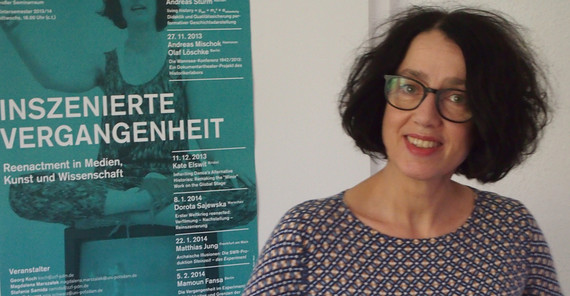Magdalena Marszałek has a soft spot for the presence of the past in the present. In a German-Polish research project, the Potsdam Slavist examines how our culture reflects on the past. The project “Performances of Memory” analyzes three strategies for coming to terms with history: testimonial, reconstructive, and counterfactual practices in literature and performative arts. Prof. Marszałek – together with Prof. Małgorzata Sugiera from Krakow and Prof. Dorota Sajewska from Warsaw, who is now at the University of Zurich – secured funding in the first edition of the joint “Beethoven” call for proposals of German Research Foundation (DFG) and its Polish counterpart, the National Science Centre (NCN).
The three scholars have a lot in common: They all live and breathe the German-Polish scholarly exchange, work in the field of memory studies, research cultural memory, and are interested in performative aspects of literature and the arts. “For us, the current project on performances of memory has been the high point of our cooperation so far,” Marszałek says. She first studied Polish philology and theater studies in Krakow. “This is also when I met my colleague Sugiera,” she explains. She then studied Slavistics, art history, and theater and film theory in Bochum. Her academic exchange with Sajewska, who is from Warsaw, has been ongoing for years. “This is the first time we have had funding for joint research, and that inspires our cooperation in a very special way.” Marszałek has been researching and teaching at the University of Potsdam for seven years. Her courses focus on Polish literature and modern and late-modern culture, cultural transformation processes in eastern Central Europe after 1989, and Polish-Jewish cultural history. Her main theoretical interests center around issues of literary and artistic documentary – such as autobiographical writing and literary evidence – as well as post-memorial aesthetics in literature, visual arts, and theater.
“Testimonies are incredibly important for our culture of remembrance”
For the three scholars in the German-Polish project, memory studies is a broad research field, which uses a variety of methodical approaches to grasp the phenomenon of “memory”, both today and historically. “We keep the past present in a very special way,” Marszałek explains. The DFG project will be exploring exactly how this works through summer 2019. The scholars in Potsdam, Krakow, and Warsaw/Zurich see their research topic as a combination of three strategies of memory culture: practices of bearing witness, reconstructive practices (including the now-popular practice of reenactment), and counterfactual strategies (including para- and mock documentaries). Marszałek is focusing on the testimonial strategy, which includes various forms of bearing witness in literature and the arts. “Testimonies are incredibly important for our cultural memory. They convey emotions and authenticity, and lay claim to truth.” But above all, she is interested in how literature and the arts deal with the role of witness and define their own testimonial tasks. For instance, University of Potsdam PhD student Dominika Herbst’s dissertation, which is part of the research project, explores the testimonial consciousness of social reportage – a new literary genre – in Poland between the two world wars. In times of historical catastrophe and the ensuing profound cultural crises, the concept of the testimony is tremendously important for literature and the arts. That is why a demand for testimonial documentary arose right after World War I, a demand which continues to this day.
The second strategy, the reconstructive approach, is being researched by Dorota Sajewska, who explores the idea of the body as an archive. It is based on the observation that in popular reenactments and artistic performances, the presentation of the past originates from experiences stored in the body. The third scholar in the joint project, Małgorzata Sugiera, analyzes the counterfactual: ‘Alternative histories’ und ‘Mockumentaries’ challenge – or even satirize – our understanding of documentary conventions. “Prevailing memory cultural practices can be opened up and reflected on in their context,” Marszałek summarizes. When we ask “What if?”, thought experiments in history become possible as well that, if nothing else, help us to better understand how important the past is for the present.
Performance as memory art
All three cultural studies scholars also explore performative moments of memory. In May, a symposium on “Performing Memory” was held in Berlin’s Sophiensäle. Three moderated evening lectures with high-profile representatives – among them Prof. Rebecca Schneider from Brown University in the US – discussed performance as memory art: What kind of memory work is done in this art form? What is the difference between performative and narrative forms of memory? Do artistic activities provide alternative access to history?
In Poland today, reflecting on the past is more topical than ever. “We did not expect the current rollback in memory politics to be that strong, but of course the context of such history politics needs to be taken into account.” The findings of the German-Polish research project will ultimately be summarized in a joint monograph. “We still have to decide which language we want to use – German or Polish,” Marszałek remarks. You can tell how much she identifies with the topic. So she will certainly be publishing more after the completion of this project.
THE RESEARCHER
Prof. Dr. Magdalena Marszałek is Professor of Slavic Literature and Cultural Studies with a focus on Polish studies at the Institute of Slavic Studies at the University of Potsdam.
magdalena.marszalekuuni-potsdampde
THE PROJECT
Performances of Memory: Testimonial, Reconstructive and Counterfactual Strategies in Literature and Performative Arts of the 20th and 21st Centuries
Head: Prof. Dr. Magdalena Marszałek (University of Potsdam), Prof. Dr. Małgorzata Sugiera (Jagiellonian University Krakow)
Project team: Dr. Mateusz Borowski (Jagiellonian University of Krakow), Dominika Herbst, M.A. (University of Potsdam), Prof. Dr. Dorota Sajewska (University of Warsaw/University of Zurich), Dr. Dorota Sosnowska (University of Warsaw)
Funding: German Research Foundation (DFG) and National Science Centre (NCN, Poland)
Duration: 2016–2019
Text: Silke Engel
Translation: Monika Wilke
Published online by: Marieke Bäumer
Contact to the online editorial office: onlineredaktionuuni-potsdampde

